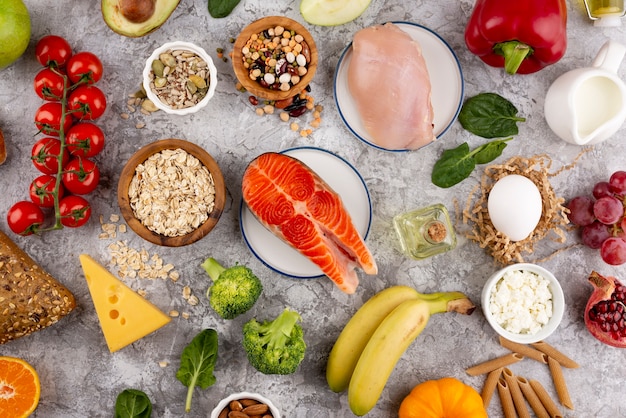
What Is Inflammation?
Inflammation can be both beneficial and harmful. It’s your immune system’s response to injuries, allergens, bacteria, or anything else it perceives as a threat. While short-term inflammation, like that from a cut or bug bite, is helpful, prolonged inflammation can weaken your overall immunity.
Initially, your body fights off these threats and then helps the affected area heal. However, when inflammation persists, it can lower your overall immunity. There are two types of inflammation: acute and chronic. Acute inflammation subsides once the issue is resolved, but chronic inflammation keeps your immune system on constant alert, which can cause significant damage over time.
How an Anti-Inflammatory Diet Can Help
Inflammation is closely linked to the digestive tract. The microbiome, which consists of bacteria and other microorganisms in your gut, plays a crucial role in regulating your immune system. Poor diets can trigger inflammation, while healthy, balanced diets help your body thrive.
Everything you consume, including supplements and your environment, affects your gut health. What you eat can either fuel or reduce your body’s inflammatory response. For instance, a diet high in calories or unhealthy fats can activate inflammation. Conversely, a diet balanced with omega-3 fatty acids (which control inflammation) and omega-6 fatty acids (which stimulate inflammation), along with exercise, sleep, water, and stress reduction, can help normalize inflammation and promote overall health.
Best Anti-Inflammatory Foods
What you avoid eating on an anti-inflammatory diet is just as important as what you include. Instead of consuming foods that trigger inflammation, you should choose foods that soothe it. The basics of an anti-inflammatory diet are similar to those of a plant-based Mediterranean diet, which is known for extending life expectancy and improving quality of life. Research suggests that vegetarians and vegans have reduced inflammation and a lower risk of heart disease.
Be cautious with carbohydrates, especially sugar, as they can disrupt the hormonal balance that affects inflammation. Experts recommend the 40-30-30 rule for your plate: 40% complex carbohydrates, 30% low-fat protein, and 30% healthy fats.
Organic Produce
Try to eat a variety of non-starchy vegetables and fresh fruits at every meal. Colorful produce is typically rich in antioxidants, which support the immune system by fighting disease-causing free radicals and preventing inflammation. Fruits and vegetables also contain phytochemicals, compounds found in plants that help protect cells.
Vegetables
Most vegetables are beneficial, but make sure to include dark leafy greens like spinach, kale, and collards; cruciferous veggies such as broccoli, cauliflower, and cabbage; root vegetables like sweet potatoes and rutabaga; and edible bulbs like onions, garlic, and scallions. Some people are sensitive to nightshade family produce (including eggplant, tomatoes, and bell peppers), but these are generally good choices for most people.
Fruits
Increase your intake of berries such as blueberries, cranberries, blackberries, and raspberries; citrus fruits like oranges, lemons, and limes; stone fruits like cherries, plums, nectarines, olives, and avocados; and pome fruits like apples, pears, and quince. Citrus fruits are excellent unless you have a citrus allergy, which can cause inflammation. Fruits contain natural sugars called fructose, which your body processes differently than processed sugar when consumed with the fiber and other components of the fruit.
Legumes & Peas
Legumes, including beans and lentils, are a great source of protein and are rich in fiber, minerals, and several antioxidant and anti-inflammatory compounds. Opt for organic black beans, Navy beans, kidney beans, garbanzo beans, or red, green, or black lentils. Soak them overnight, discard the soaking water, and cook them in fresh water. Green peas also offer anti-inflammatory benefits.
Gluten-Free Whole Grains
Whole grains contain antioxidants and fiber, which help reduce the inflammation marker called C-reactive protein (CRP). Always choose gluten-free grains, as gluten can cause digestive and systemic inflammation in many people. The best whole grain choices include oats, steel-cut oatmeal, barley, brown rice, bulgur, quinoa, and ancient grains like amaranth, teff, and buckwheat.
Extra Virgin Olive Oil
Extra virgin olive oil (EVOO) is a healthy fat suitable for cooking and recipes. It contains heart-healthy monounsaturated fat, antioxidants, and a compound called oleocanthal that can lower inflammation. Use EVOO for stove-top cooking, drizzling on salads, and more.
Nuts & Seeds
Nuts and seeds are rich in monounsaturated fat and contain heart-healthy fiber. Opt for raw, unsalted varieties for optimal nutrition. Good choices include walnuts, almonds, pine nuts, cashews, sunflower seeds, and pumpkin seeds.
Herbs & Spices
Herbs and spices not only add flavor to meals but also contain many antioxidants. Turmeric, in particular, is powerful due to its curcumin content, which is effective at reducing redness and swelling. Garlic, ginger, and cinnamon also have strong anti-inflammatory properties.
Foods to Avoid
Just as there are foods you should eat on an anti-inflammatory diet, there are also foods you should avoid as they can aggravate inflammation. Here are the most important ones to steer clear of:
Processed Foods
Many commercial products are highly refined and processed, making them low in nutrients and fiber. They are often high in omega-6 fats (which promote inflammation), saturated fats, and trans fats. Processed foods also typically contain added sugars, which raise blood sugar and increase inflammation. Avoid chips, crackers, white bread, pasta, most boxed breakfast cereals, mixes, and frozen dinners.
Sugar
Sugar is one of the worst offenders for triggering inflammation. It causes the body to release cytokines, chemical messengers that increase immune system activity and cause systemic swelling. Avoid sweets like cookies, candy, cakes, ice cream, and sugar-sweetened beverages like soda, lemonade, and sweet tea. Stay away from refined sugars and high-fructose corn syrup, as well as natural sweeteners with high sugar content like honey, agave nectar, and maple syrup. If you must have something sweet, opt for a small amount of organic dark chocolate with at least 70% cocoa. Also, avoid artificial sweeteners like aspartame, saccharine, and Splenda.
Fried Foods
Fried foods, especially deep-fried ones, contain inflammation-triggering saturated fats and trans fats. They are typically fried in unhealthy oils and coated in batter made from refined flour. Avoid anything fried, especially fast food like french fries and donuts.
Meat
Meat, particularly processed meat, is highly inflammatory due to its saturated fat, hormones, and antibiotics content. Studies have linked processed meats with chemical additives to cancer. Avoid beef, lamb, poultry, and game meats, as well as processed meats like hot dogs, sausage, pepperoni, and beef jerky.
Most Fats & Oils
Saturated and polyunsaturated fats are high in inflammation-promoting omega-6 fatty acids, and trans fats raise “bad” cholesterol. Instead of using butter and margarine, flavor your food with herbs and spices. Avoid cooking with lard, shortening, or vegetable oils like canola, corn, soybean, safflower, peanut, or cottonseed. Use healthy cooking oils sparingly.
A Sample Meal Plan
Here is an example of what an anti-inflammatory diet could look like:
Day One
Breakfast: Oatmeal with blueberries, flax seed, and walnuts with almond milk.
Lunch: Homemade three-bean chili on brown rice topped with chopped onions, with an apple on the side.
Dinner: Mixed spinach and kale salad dressed with EVOO, apple cider vinegar, and herbs; quinoa bowl with red bell peppers, black beans, and avocado; two squares of dark chocolate for dessert.
Day Two
Breakfast: Plain coconut-milk yogurt topped with strawberries, almonds, and sunflower seeds.
Lunch: Open-faced lentil-veggie burger on half an ancient-grain bun topped with raw onion, spinach leaves, and tomato slices; baked sweet potato fries.
Dinner: Soba (buckwheat) noodles topped with sautéed mixed vegetables and garlic, topped with nutritional yeast.
Day Three
Breakfast: Avocado toast (on gluten-free whole-grain bread) topped with pumpkin seeds.
Lunch: Tostada made with vegetarian refried beans seasoned with chili powder and turmeric on a wheat-free multigrain tortilla. Top with salsa, chopped tomatoes, and scallions.



